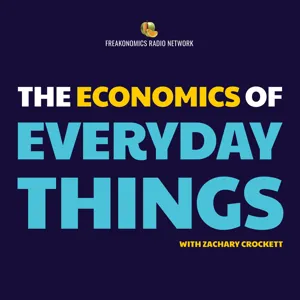Podcast Summary
Innovative Ways to Repurpose Waste: Recycling waste can generate valuable resources. With creativity and innovation, even niche industries can find solutions to their problems. One person's waste can become another's treasure through dedication to sustainability.
Ken Johnson, founder of PredatorPee.com, found a way to turn animal urine, a waste product to most people, into treasure. He used his knowledge from working with Foggy Mountain Hunting Scents and Lures to start his own business recycling animal urine. The product is used as a natural repellent for pests in gardens and farms. His story highlights the innovative ways waste can be converted into something valuable. It also shows how people in niche industries like hunting can find creative solutions to common problems. Johnson's dedication to sustainability and recycling shows how one person's waste can become another person's treasure.
The Role of Animal Urine in Hunting and Pest Control: Animal urine is not only useful for hunters to mask their scent, but also as a natural way to protect gardens and landscaping from deer. It is a growing market with many retailers now selling pee products.
Animal urine, specifically fox urine and coyote urine, is used by hunters to mask their scent and get closer to their prey. Johnson, who entered the animal pee business in the 1980s, discovered that animal urine is a communication tool in the wild used by animals to find mates and protect their territory. With the increase in suburban and rural development, the deer population in the US grew from around 300,000 to 32 million, causing significant damage to gardens and landscaping. Johnson saw an opportunity to sell coyote urine as a solution for homeowners looking to keep deer away from their property. The market for animal urine has never been hotter, with big-box retailers and small outfits alike selling pee products by the gallon.
PredatorPee.com and the High Demand for Animal Urine: PredatorPee.com has dominated the market for natural pest control with their collection and shipment of various animal urine types. Their product has helped solve pest problems worldwide, including Japan's wild boars and Denver Airport's rabbits.
The demand for animal urine, particularly coyote and wolf urine, is high due to the increase in the coyote population and the need for natural pest control. PredatorPee.com dominates a significant share of this market, collecting the urine from zoos, game farms, and refuges. The pee is then stored in 55-gallon drums and shipped to customers worldwide. Surprisingly, Japan is the company's largest customer, using the product to keep wild boar out of rice paddies. Johnson's predator urine even helped solve a rabbit infestation problem at Denver International Airport. The company offers various types of animal urine for different pests, from fox urine for squirrels and rabbits to mountain lion urine for wild boar, armadillo, and javelina.
The Unconventional Market for Predator Urine and its Uses: Predator urine can be an effective and natural pest control product, preferred by some customers. However, caution should be exercised while transporting, and the product may also be used for non-conventional purposes like pranking or revenge.
Predator urine is an all-natural pest control product that uses animals' natural instincts to deter pests. While scientific evidence on the effectiveness of predator pee varies, some customers prefer using natural products instead of lab-made chemicals. Animal urine also has other uses, like as a prank or a form of revenge. Despite its unconventional uses, the market for animal waste has been profitable for Johnson's family for 37 years. Customers of predator pee often buy $100 worth of it to keep pests out of their gardens or chicken coops. While transporting animal urine, it's crucial to be careful in packing to avoid any bursting incidents during transportation.

